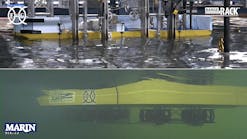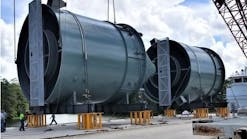Following the lifting of the US' trade embargo on Vietnam, several oil and gas service conglomerates were quick to establish bases there. They already dominate drilling and production service revenues in Vietnam, 90% of which are earned by foreign-owned companies.
The government is not happy. At the Party Congress last June, it was pointed out that Vietnam's own share of its service sector had not risen in the past five years, and this was mainly at the low technology end. And despite having a healthy stratum of well-educated, computer-literate people, few Vietnamese seemed to be getting into good positions; nor were foreign companies really coming through with training programs to help the Vietnamese.
Scottish Enterprise is hoping to change the foreigner-pariah image by assisting the Vietnamese to build up their own service industry. SE's Energy Group recently secured European Community Investment Funding to this end.
The aim is to involve Scottish service companies in joint ventures, technology transfer or on a franchise basis in Vietnam. Regarding joint ventures Bob Downes, SE's director of Industry and Skills, stated: "To reduce concerns operators may have with using newly formed service companies, quality control will remain firmly in the hands of the Scottish company and the JV will clone the standards of the latter's UKCS operation."
Some established British companies have pulled out of the Vietnamese oil and gas sector, disappointed by the downturn in drilling activity and BHP's exit from Dai Hung. On the development front, opportunities may be limited in the next wave of new field projects, which look like being dominated by Far East operators.
However, SE's manager for South East Asia, Alastair Rose, says he and his colleagues are taking a longer-term view: "We're trying to be very, very focused on PetroVietnam and Vietsovpetro." PetroVietnam in particular is keen on joint ventures - "in some cases, they want to do everything," Rose says, "but they need help in being focused".
Vietsovpetro, though not a key player currently in exploration, still owns Vietnam's major producing asset, the Bach Ho Field, where there are 13 platforms to maintain. Rose sees opportunities for Scottish companies in helping to extend the field's service life.
New base
Red Baron Oil Tools has operated a base in Vietnam for some time, and Hunting Oilfield Services has reportedly just committed to a base. According to Rose, 10-12 other Scottish oilfield specialist companies have expressed interest in Vietnam through the SE programme.
This January, SE and the Expro Integrated Services Group made a presentation to Vietnamese oil and gas officials. Expro is as a result likely to train Vietnamese nationals in reservoir and well service management. The country's officials are now keen for SE to establish an office in Vietnam: if this goes ahead, a PetroVietnam representative may be seconded to help out. Reciprocal visits to Scotland are also planned, with a Vietnamese contingent possibly coming to Offshore Europe in September.




